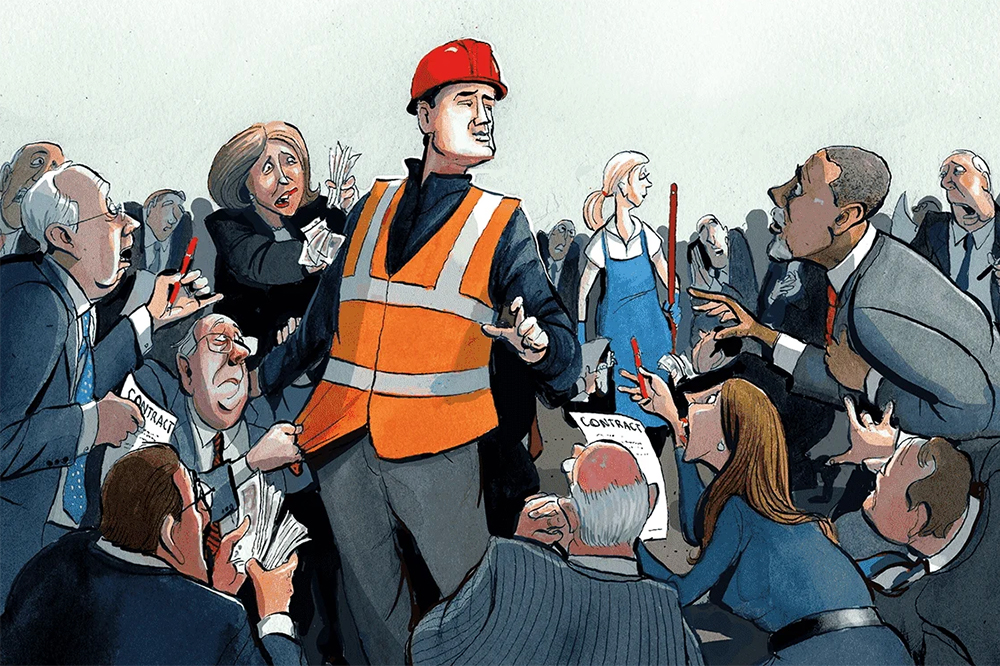To grasp the scale of Britain’s welfare crisis, consider some of the changes announced by the government this week. There will be tighter restrictions on sickness benefit and people with mobility issues will have to work from home. It’s a big and controversial reform. But the result? The number of Britons claiming sickness benefits – 2.8 million – will still keep rising to 3.4 million by the end of the decade. Reversing this trend, it seems, is a political impossibility.
The worst aspect is that Mel Stride, the Work and Pensions Secretary, is probably going as fast as the system can manage. His reforms will likely be met with a volley of judicial reviews, even though no changes are due before April next year. These bold reforms are in all likelihood simply suggestions for the next Labour government. The welfare system will meanwhile keep on absorbing an ever greater share of the workforce. The Universal Credit bill is expected to rise by £30 billion, or 40 per cent. It is a scandalous waste of money and of lives.
The Tories struggle to get even minor change through a welfare system clearly out of control
This crisis can be seen everywhere except in the national debate. Andy Burnham, the Mayor of Manchester, recently said that he had not been aware that 18 per cent of working-age adults in his city are on out-of-work benefits. Perhaps this explains his failure to translate its prosperity into jobs, welfare, social cohesion and the other benefits that ought to accompany economic growth.
It’s amazing what you can cover up if you use ‘official’ unemployment numbers. Anyone signing on has a number of options. Claiming unemployment is one, but claiming sickness benefit – which is done by 4,000 people every day – is another. This is why the total number claiming out-of-work benefits has risen to 5.5 million, up 300,000 since May last year. This figure should be a scandal, yet it goes almost entirely unreported, which means it remains unsolved. Everyone looks the other way.
Jeremy Hunt this year laid out economic growth projections – a miserable 0.6 per cent this year, 0.7 per cent next – but the real picture will be even less impressive. Workers are facing two decades of no growth in their real-terms average wage. The Tories have failed to link economic growth to improving living standards or falling unemployment. The disability caseload is expected to surge from five to seven million, so any boasts about growth are laughable.
It is no surprise that it is such a struggle to grow the economy when you consider both the welfare bill and the tax burden. The Chancellor’s decision to protect the triple-lock bribe to pensioners will add £30 billion to this. And while Rishi Sunak’s tax cuts are welcome, they don’t change the overall trajectory of a tax burden that is the highest for decades and still rising – as is debt.
We can at least see some serious intent with the welfare reforms under way. The issue is with the assessments that have been made. When David Cameron took power, just 3,000 people a month were assessed as being too sick to be able to do any work at all. That has risen tenfold.
Claiming to be suicidal, for example, can be a fast track to the maximum benefits payout: some 14 per cent of sickness benefits claimants are put in a top-risk category that was only ever intended for a very small number of people. On both of these counts Stride is trying to restore balance; but this system moves so slowly that any plans made now could only be implemented after the election.
Would Labour continue the mission? Since Liz Kendall was made shadow work and pensions secretary, we have heard disappointingly little from her on the subject. Her party does have a proud tradition of welfare reform – Frank Field, James Purnell, John Hutton – but that was back in the Blair era when Labour was a reforming party. Now it is a party of caution, seemingly terrified of doing anything that could jeopardise its 20-point opinion poll lead over the Tories. If Labour fails to recognise the scale of the problem, it is certain to fail to address it once in office.
So the picture we see from this week’s Autumn Statement goes beyond what the Tories have in store for their pre-election year. Their in-ability to control the size of the state – especially pensions and welfare – has created a surging tax bill that will continue to rise, whatever Sunak pretends. All these problems are set to be inherited by a Labour government which shows no sign of having given them any consideration. And then there is mass migration, which is being used by both parties to cover up problems they would rather not address.
The vote for Brexit was, in large part, a vote for a better economic model: one that would force politicians to address difficult problems and not look to globalisation to provide easy answers. The Tories started off trying to honour this pledge but struggle to get even minor change through a welfare system clearly out of control. Labour shows no sign of being willing to recognise the problem. The voters who had hoped for something different at the next election will not have much of a choice.
This article is free to read
To unlock more articles, subscribe to get 3 months of unlimited access for just $5








Comments
Join the debate for just $5 for 3 months
Be part of the conversation with other Spectator readers by getting your first three months for $5.
UNLOCK ACCESS Just $5 for 3 monthsAlready a subscriber? Log in